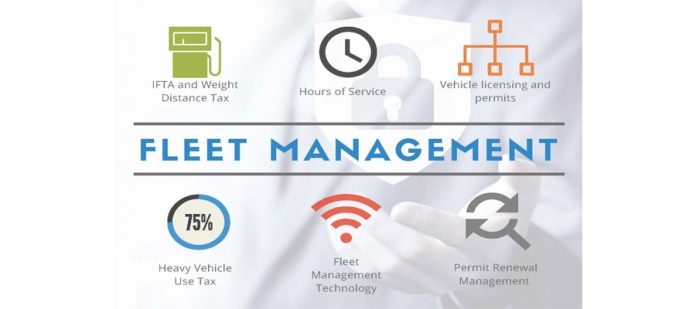In 2023, the global fleet management market is likely to hit a value of US$ 13,868.2 million. According to Future Market Insights (FMI), the market may rise steadily at a CAGR of 10.4% between 2023 and 2033, as end-use industries around the world demonstrate considerable demand for fleet management to improve transportation network operations. The global fleet management market may reach US$ 37,300.17 million by 2033.
The growing concern about fleet safety, required government laws for vehicle maintenance and tracking, the requirement for operational competency in fleet management, and a boom in the adoption of wireless technology due to its low cost and availability, all make significant contributions to the fleet management software market growth.
Low Signal Strength and Employee Backlash to Slow Market Development Fleet
The limiting element that prevents the fleet management software market from expanding is atmospheric inference, which has caused problems with GPS connectivity. Yet for the signal to reach mobile phones, it must travel a great distance, endure various air conditions, and switch between numerous satellites. As additional satellites are added or removed, the precision of the signal declines, which limits market expansion.
Windows of Opportunities in the Market
Factors such as the expansion of transportation in the logistics industry, the adoption of intelligent modes of transportation, and the improvement of communication networks present several chances for the fleet management market growth throughout the projection period.
Mobility industries and government agencies are embracing the mobility-as-a-service approach to optimize traffic and carbon emissions. They are providing ride-hailing, carpooling, automobile sharing, and other alternatives for commuting to drive their car. The fleet management software is supposed to aid in getting insights into pick-ups, drop-offs, automotive telematics, and payment practices.
Key Takeaways
- The software category in the component segment of the fleet management software market is expected to thrive at an 11.6% CAGR between 2023 and 2033, surpassing US$ 6,612.9 million by 2023.
- The consulting & advisory category in the professional services segment in the fleet management market is anticipated to progress at a CAGR of 7.3% between 2023 and 2033, gaining US$ 103.8 million by 2023.
- The trucks/cars/buses segment is projected to expand at a CAGR of 13.6% between 2023 and 2033, hitting US$ 5,788.4 million by 2023.
- The driver behavior monitoring sector is expected to blossom at a CAGR of 14.9% between 2023 and 2033, exceeding US$ 1,745.5 million by 2023.
- The transportation category is likely to develop at a CAGR of 13.7% between 2023 and 2033, achieving US$ 5,583.2 million by 2023.
- By component segment, the hardware sector may possess a 47.7% market share by 2023.
- By 2023, the support & maintenance sector in the professional services segment can grasp a market share of 59.8%.

- By fleet type, the trucks, cars, and buses segment may capture a 41.7% market share by 2023.
- Fleet tracking and geofencing are likely to achieve a market share of 43.4% by application category by 2023.
- By industry sector, the transportation sector is likely to gain a 40.3% market share by 2033.
- The market in North America may reach US$ 4,228.5 million by 2023 and register a CAGR of 9.5% between 2023 to 2033.
- Throughout the years 2023 to 2033, the Latin American market is expected to expand at a CAGR of 8.1%, approaching US$ 834 million by 2023.
- From 2023 to 2033, the Europe fleet management software market may expand at a CAGR of 13.8%, with a potential peak of US$ 3,726.4 million in 2023.
- The market in South Asia and the Pacific may flourish between 2023 and 2033 at a CAGR of 9.2% and could total US$ 1,970.3 million by 2023.
- The market in East Asia might sprout between 2023 and 2033 at a CAGR of 8.7%, with a potential value of US$ 2,566.0 million by 2023.
- Between 2023 and 2033, the fleet management software market in the Middle East and Africa is likely to evolve at a CAGR of 7.4% and reach US$ 543.0 million by 2023.
Outlook of the Fleet Management Market
TomTom N.V. United States, Fleetmatics Group PLC, General Services Administration, Freeway Fleet Systems, IBM Corporation, Telogis, AT&T Inc., Grupo Autofin de Monterrey, and Navico I.D. are some notable participants in the fleet management market research.
Companies including FAMSA, Troncalnet, Didi Chuxing, Grab, Cisco Systems, Uber Technologies, Trimble Transportation & Logistics, Ola Cabs, and Trimble Transportation & Logistics, among others, use the system.
There are tier-1, tier-2, and local players in the fleet management software market. To diversify their product offerings, the top market players make significant investments in cutting-edge research and software development. The companies are collaborating with technology vendors to enhance fleet management with state-of-the-art tracking, accurate GPS, and enhanced driver support.
Zebra Technologies Corp., Trimble Inc., Cisco Systems, Inc., GoFleet Corporation, Geotab Inc., Digital Matter, GPS Trackit, GoGPS, Wireless Links, Embitel, Gurtam, Teletrac Navman, Linxio, StreetFleet, TigerFleet, Ruptela, Trakm8 Limited, and WebEye Telematics Group are some of the other leading companies in the fleet management market.
Pivotal Competitive Advancements
-
LILEE Systems – January 2022
A provider of autonomous driving systems and transportation safety solutions debuted advanced fleet management software and an autonomous car at CES 2022 in the United States.
-
AUSA – November 2021
A producer of industrial vehicles debuted AUSA, online fleet management software, in the global market. It provides invested parties with real-time information regarding vehicle maintenance, technical issues, and performance tests.
-
Smart Drive – September 2020
Omillionitracs, LLC, has acquired a provider of video-based safety and transportation analytics. The business hopes to provide advanced fleet management solutions combining artificial intelligence (AI) and machine learning (ML), video safety technology, and risk analysis services through Smart Drive integration.








